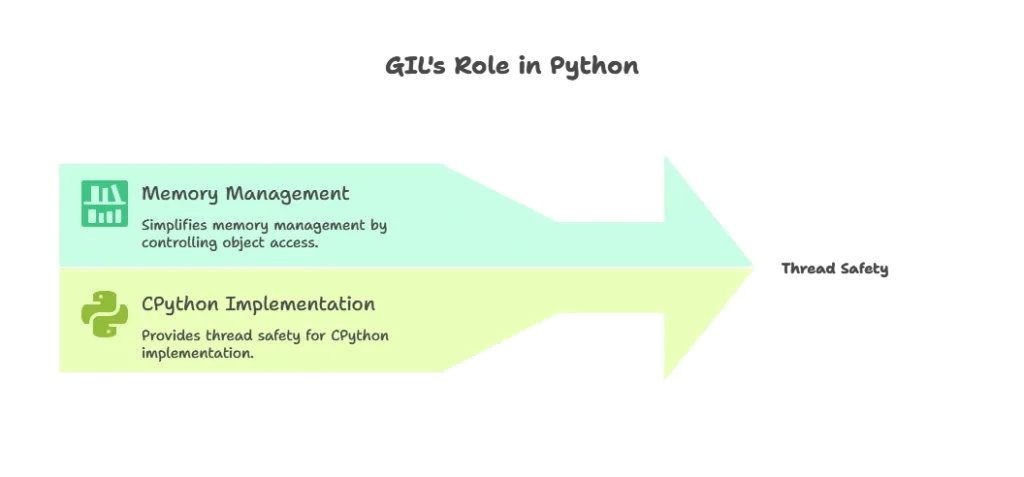Python's Global Interpreter Lock (GIL)
Python's Global Interpreter Lock (GIL) is a mechanism used in the CPython interpreter to ensure that only one thread executes Python bytecode at a time. This means that even in a multi-threaded Python program, only one thread is allowed to execute Python code at any given moment.
Understanding the Global Interpreter Lock
Introduction to GIL
The Global Interpreter Lock (GIL) is a mutex that protects access to Python objects, preventing multiple native threads from executing Python bytecodes simultaneously.
Purpose of GIL
- Simplifies memory management by ensuring that objects are accessed by only one thread at a time.
- Provides thread safety for CPython, the default implementation of Python.

How GIL Works
Understanding the Execution Model
- In CPython, the GIL is a mutex that protects access to Python objects and prevents multiple threads from executing Python bytecodes concurrently.
- Each thread must acquire the GIL before executing Python bytecodes, and release it when finished.
GIL and Multi-Threading
- Although Python supports multi-threading, due to the GIL, multi-threaded Python programs may not achieve true parallelism.
- The GIL ensures that only one thread executes Python bytecodes at a time, which can limit performance in CPU-bound tasks.
Impact of GIL on Performance
CPU-Bound vs. I/O-Bound Tasks
- For CPU-bound tasks, where the majority of time is spent on computation, the GIL can significantly impact performance because it prevents true parallelism.
- However, for I/O-bound tasks, where threads spend most of their time waiting for external resources (e.g., network requests, file I/O), the impact of the GIL is less significant.
Mitigating the Impact of GIL
- Techniques such as multiprocessing and asynchronous programming (e.g., asyncio) can be used to mitigate the impact of the GIL in CPU-bound tasks by leveraging multiple processes or non-blocking I/O operations.
Examples and Demonstrations
Example: CPU-Bound Task with Threading
Consider a CPU-bound task that calculates the sum of squares of numbers using multiple threads.
import threading
def calculate_sum_of_squares(n):
total = 0
for i in range(n):
total += i * i
return total
def main():
threads = []
for _ in range(4):
thread = threading.Thread(target=calculate_sum_of_squares, args=(1000000,))
thread.start()
threads.append(thread)
for thread in threads:
thread.join()
if __name__ == "__main__":
main()
Explanation:
- We define a function
calculate_sum_of_squares(n)that calculates the sum of squares of numbers up ton. - In the
main()function, we create 4 threads, each calling thecalculate_sum_of_squaresfunction withn=1000000. - Each thread is started using the
start()method, and we keep track of them in thethreadslist. - We then wait for all threads to finish execution using the
join()method.
Example: Mitigating GIL Impact with Multiprocessing
Consider the same CPU-bound task, but using multiprocessing to leverage multiple CPU cores.
from multiprocessing import Process
def calculate_sum_of_squares(n):
total = 0
for i in range(n):
total += i * i
return total
def main():
processes = []
for _ in range(4):
process = Process(target=calculate_sum_of_squares, args=(1000000,))
process.start()
processes.append(process)
for process in processes:
process.join()
if __name__ == "__main__":
main()
Explanation:
- We define the same
calculate_sum_of_squares(n)function as in Example 4.1. - In the
main()function, we create 4 processes instead of threads, each calling thecalculate_sum_of_squaresfunction withn=1000000. - Each process is started using the
start()method, and we keep track of them in theprocesseslist. - Similar to threading, we wait for all processes to finish execution using the
join()method.
In the above topic, we've explored the concept of Python's Global Interpreter Lock (GIL) and its impact on multi-threaded Python programs. Despite Python's support for multi-threading, the presence of the GIL restricts true parallelism by allowing only one thread to execute Python bytecode at a time. This limitation primarily affects CPU-bound tasks where threads spend most of their time performing computation.
To mitigate the impact of the GIL, developers can leverage multiprocessing, which allows for true parallelism by spawning multiple processes, each with its own Python interpreter and GIL. Additionally, asynchronous programming techniques such as asyncIO can be used for I/O-bound tasks to achieve concurrency without relying on multiple threads. Happy coding! ❤️
